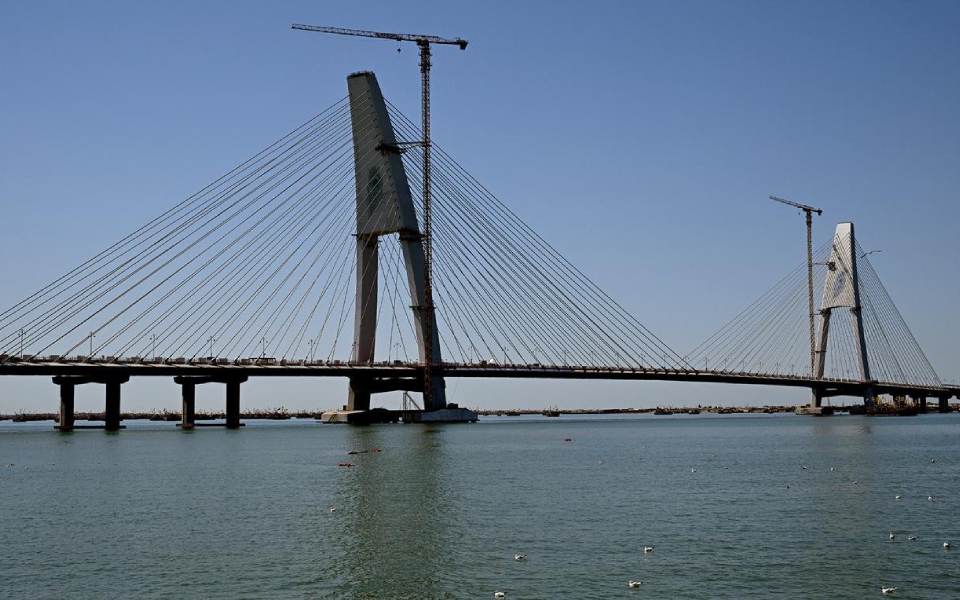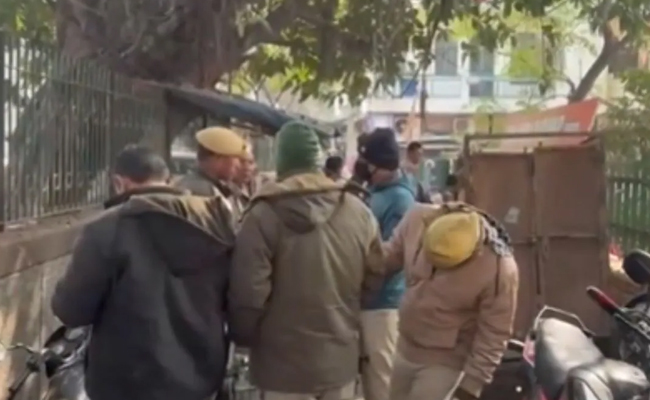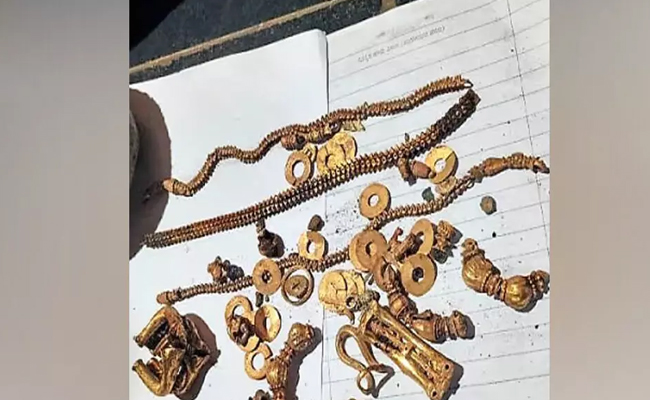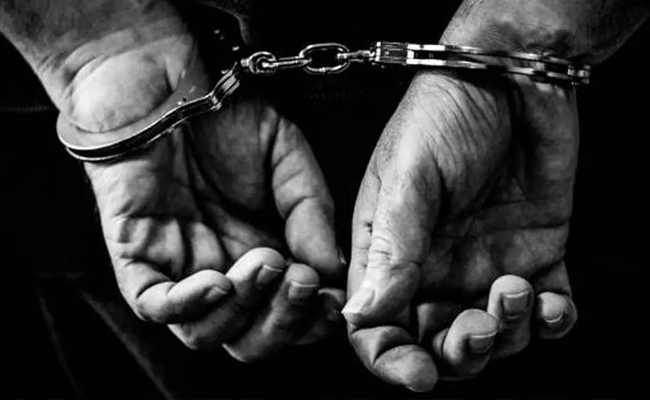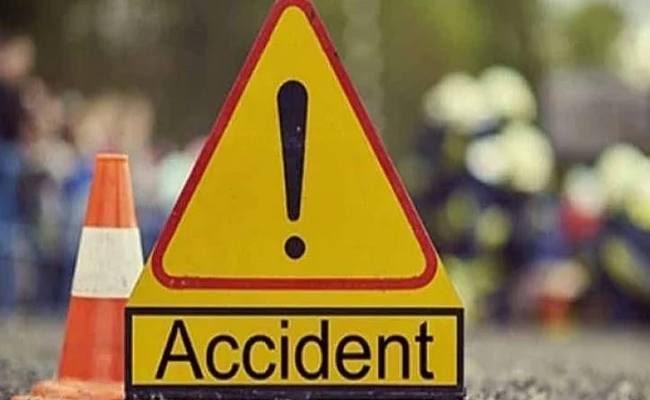Devbhumi Dwarka, Feb 25: Prime Minister Narendra Modi on Sunday inaugurated 'Sudarshan Setu', the country's longest cable-stayed bridge of 2.32 km, on the Arabian sea connecting Beyt Dwarka island to mainland Okha in Gujarat's Devbhumi Dwarka district.
Modi began his day by offering prayers at Lord Sri Krishna temple at Beyt Dwarka.
He later inaugurated the four-lane cable-stayed bridge called the 'Sudarshan Setu', which boasts a unique design, featuring a footpath adorned with verses from Srimad Bhagavad Gita and images of Lord Krishna on both sides.
The 2.32 km bridge, including 900 metres of central double span cable-stayed portion and a 2.45 km long approach road, has been constructed at a cost of Rs 979 crore, as per an official release.
The four-lane 27.20 metre wide bridge has 2.50 metre wide footpaths on each side, it said.
The bridge, which was known as 'Signature Bridge', has been renamed as 'Sudarshan Setu' or Sudarshan Bridge.
Beyt Dwarka is an island near Okha port, which is nearly 30 km from Dwarka town, where the famous Dwarkadhish temple of Lord Krishna is situated.
At present, devotees visiting the temple at Beyt Dwarka can travel only during the day by boat, while the construction of the bridge will allow them to travel at all times, officials said.
The Sudarshan Setu, which would be inaugurated by PM @narendramodi in a short while! pic.twitter.com/zF5RbvaYoN
— PMO India (@PMOIndia) February 25, 2024
Delighted to inaugurate Sudarshan Setu today - a bridge that connects lands and people. It stands vibrantly as a testament of our commitment to development and progress. pic.twitter.com/G2eZEsa7EY
— Narendra Modi (@narendramodi) February 25, 2024
Let the Truth be known. If you read VB and like VB, please be a VB Supporter and Help us deliver the Truth to one and all.
New Delhi (PTI): A 44-year-old woman was shot dead at point-blank range in northwest Delhi's Shalimar Bagh on Saturday, with police suspecting the killing to be a fallout of the 2023 murder of her husband, an official said.
The deceased was identified as Rachna Yadav, a resident of Shalimar Bagh and the resident welfare association (RWA) president of her locality. According to police, she was shot in the head and died on the spot.
Police said Rachna was originally from Bhalswa village in north-west Delhi. Investigators suspect that the murder is linked to the killing of her husband, Vijendra Yadav, who was shot dead in 2023. The case concerning that murder is currently under trial.
"In the 2023 case, Vijendra Yadav was allegedly murdered due to previous enmity. Bharat Yadav and five others were named as accused. While five of the accused were arrested and are facing trial, the main accused, Bharat Yadav, is still absconding and has been declared a proclaimed offender," a senior police officer said.
Police said Rachna was the main witness in her husband's murder case, and her testimony was considered vital for the prosecution. Investigators believe her killing may have been aimed at weakening the case and intimidating other witnesses.
CCTV footage has surfaced in the Rachna Yadav murder case, clearly capturing the accused who allegedly shot her. Police said the assailant's accomplice was already waiting nearby on a sports bike bearing a Delhi registration number, facilitating a swift escape, according to an official.
Police said a PCR call was received at around 10.59 am at Shalimar Bagh police station, reporting that a woman had been shot.
Local police teams rushed to the spot and found Rachna lying on the road in a pool of blood. An empty cartridge was recovered from the scene, officials said.
According to the investigation, when Rachna was returning after meeting a neighbour, two assailants intercepted her. One of them allegedly stopped her and asked her name. When she identified herself, the attacker pulled out a firearm and shot her in the head before fleeing the spot along with his accomplice, police said.
Preliminary inquiry suggested that the woman was targeted, and the assailants appeared to have prior knowledge about her identity and movements.
"Crime Team and FSL teams were immediately called, and the scene of the crime was thoroughly examined. CCTV footage from nearby areas is being scanned to identify the assailants," Additional Commissioner of Police (Northwest) Bhisham Singh said.
Prima facie, it appears that the present case is linked to the earlier murder, he said. "We are re-examining all aspects of the 2023 case and the role of the proclaimed offender (Bharat)," Singh said, adding that multiple teams have been formed to trace the shooters and those who may have masterminded the crime.
Speaking to reporters, Kanika Yadav, the deceased's elder daughter, alleged that the murder was planned by Bharat.
"Some of the accused in my father's murder case are lodged in Tihar Jail. Despite that, they are planning such crimes. Bharat Yadav planned and executed my mother's murder," she alleged.
Kanika claimed her mother was killed because she was standing firm as a witness in her father's murder case.
"They were afraid that they would be convicted on the basis of her statement. That is why my mother was killed. My father was murdered in 2023, and the case is still pending before the court," she said.
Police said Rachna is survived by two daughters, one of whom is married, while the younger daughter lived with her. Security has been stepped up in the area, and further investigation is underway, police added.

